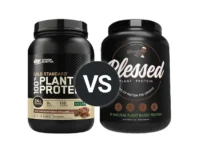Knowledge BaseYou're Questions Answered
Is whey protein powder vegan?
Whey protein powder is a popular dietary supplement known for its high-quality protein content and fast absorption rate. It is commonly used to support muscle growth, recovery, and overall protein intake. A key consideration for many individuals is whether a protein source is vegan, meaning it contains no animal-derived ingredients or by-products.
Whey Protein Powder and Veganism
No, whey protein powder is not vegan. Whey protein is derived from milk, a by-product of the cheese-making process. During this process, the liquid whey is separated from the curds, which are then processed and purified to create whey protein powder. Since milk is an animal-derived product, whey protein is not suitable for a vegan diet1.
Why Whey Protein Is Not Vegan
- Source of Whey: Whey protein is extracted from cow's milk, making it an animal-derived product. As such, it does not align with vegan dietary principles, which exclude all animal products.
- Types of Whey Protein: There are different types of whey protein, including whey protein concentrate, whey protein isolate, and whey protein hydrolysate. Regardless of the type, all are derived from milk and are therefore not vegan2.
Vegan Alternatives to Whey Protein
For individuals following a vegan diet, there are several plant-based protein powder alternatives that provide high-quality protein without the use of animal products. Some popular vegan protein sources include:
- Pea Protein: Made from yellow peas, pea protein is a popular vegan protein powder that provides a complete amino acid profile.
- Rice Protein: Derived from brown rice, rice protein is another common plant-based option, often combined with other plant proteins to ensure a complete amino acid profile.
- Soy Protein: Soy protein is a well-established plant-based protein source that offers a complete amino acid profile.
- Hemp Protein: Made from hemp seeds, hemp protein provides additional nutrients such as omega-3 and omega-6 fatty acids along with protein.
- Smithers, G. W. (2008). Whey and whey proteins—from ‘gutter-to-gold’. International Dairy Journal, 18(7), 695-704.
- Hoffman, J. R., & Falvo, M. J. (2004). Protein–which is best? Journal of Sports Science & Medicine, 3(3), 118-130.
Related Questions
Related Reviews

Your Answer
We are a participant in the Amazon Services LLC Associates Program, an affiliate advertising program designed to provide a means for us to earn fees by linking to Amazon.com and affiliated sites.



